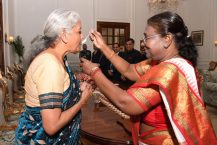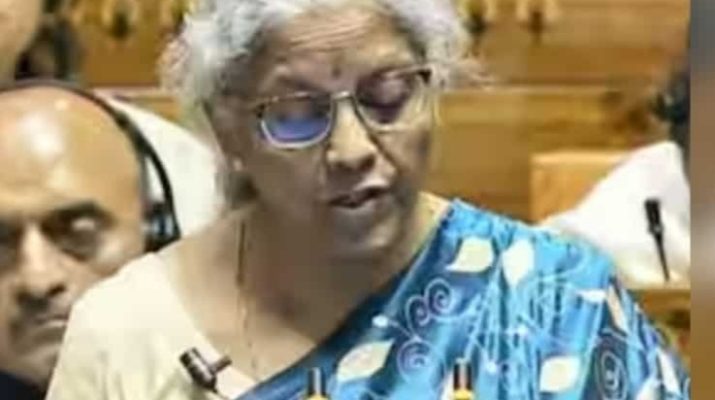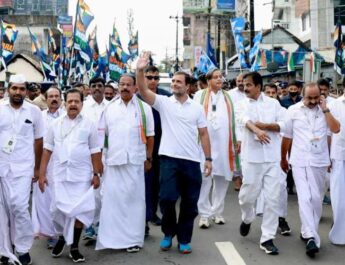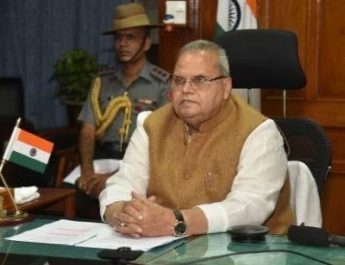NEW DELHI: Union Finance Minister Nirmala Sitharaman was on Thursday quite optimistic of the Modi government returning to power winning the upcoming elections as she said the government will present a detailed roadmap for pursuit of “Viksit (prosperous) Bharat” by 2047 as envisaged by Prime Minister Narendra Modi.
Presenting an hour-long interim budget for 2024-25 in the Lok Sabha, the last one by the Modi government before the country heads to the general elections, she used a tablet to read out the interim budget as approved by the Cabinet in the Parliament House, assuring higher sustainable economic growth path and promising a white paper on how the economy has functioned in the last 10 years since Modi came to power in 2014.
The Finance Minister speaks on the themes of Sabka Saath, Sabka Vikaas, and Atmanirbhar Bharat and affirms: “We expect that our govt., based on its stupendous work, will be blessed with a resounding mandate”
She highlighted the achievements of the Modi government in the past 10 years, vowing social justice effectively and said the country’s welfare and progress depended on the betterment of the poor, women, youth and the Annadata (farmers).
She pegged India’s real GDP growth at closer to 7% in 2024-25 with considerable scope to outpace 7% by 2030, adding that the economic will hit US $5 trillion in the next three years, making India the third largest in the world. She presented exemplary track record of governance, focussed on a more comprehensive GDP, i.e. Governance, Development and Performance.
“Our govt has provided transparent, accountable, and prompt trust-based administration. The impact is discernible in all sectors,” she said.
As expected, she followed the convention of not changing the direct or indirect taxes, including the import duty. However, certain tax exemptions for startups and IFSC units are expiring on march 31, 2023. To provide continuity in taxation, I propose to extend these till March 31, 2025, the Finance Minister said.
GST: By unifying the tax system, the GST has reduced the compliance burden on trade and industry. As per a recent survey, 94% of industry leaders view the transition to GST as largely positive.
States too have benefited, Ms. Sitharaman says. She adds that the biggest beneficiary is the consumer as reduction in logistics costs and taxes has helped bring down prices.
Listing out the previous changes made in the tax provisions, Ms. Sitharaman thanks taxpayers for their continued support.
Under the new tax scheme, there is now no liability for those earning upto Rs. 7 lakh a year. The threshold for presumptive taxation for retail businesses was increased from Rs. 2 crore to Rs. 3 crore.
Corporate tax rate was decreased from 30% to 22% for existing companies and 15% for certain new manufacturing industries.
Filing tax returns has become simpler and easier. The average processing time of returns has been lowered from 93 days in 2013-14 to a mere 10 days, thereby making refunds faster, Sitharaman affirmed.
“Our govt. stands committed to create an economy with high growth and an environment to enable people to meet their aspirations,” she said.
“Every challenge of the pre-2014 era was overcome through our economic management and governance. This has placed the country on a sustained path of high growth. In the full Budget in July, our Govt. will present a detailed roadmap for our pursuit of Viksit Bharat”.
Sitharaman also announced formation of a high-powered committee to review challenges arising from fast population growth and demographic changes.
She also promised a pie to the states in the “Viksit Bharat.” Rs. 75,000 crore is being proposed as 50-year interest free loan for milestone-linked reforms by States.
Guided by the principle of Reform, Perform and Transform, the government will take next-generation reforms, she added.
On the Lakhpati didi yojana launched by the PM in December, she said 1 crore women in the self-help groups scheme in rural area have become lakhpati. The Prime Minister had set the target of 2 crore that was revised by her to 3 crore.
She also referred to the PM Awas Yojana in villages as she said despite challenges, India is close to achieving the target of 3 crore houses and 2 crore more houses will be taken up in the next five years. She aid saving of Rs 18,000 crore is expected to the households annually through free energy and selling their excess generation to the grid. One crore houses will be enable to obtain up to 300 units of free electricity per month through the rooftop solar technology.
The finance minister also promised to implement three major railway corridors, namely Energy, mineral and cement corridor, Port-connectivity corridor and High-traffic density corridor.
They will improve logistics efficiency, and reduce cost, besides improving safety for passenger trains as well. She said
40,000 normal rail bogeys will be converted to Vande Bharat standards.
STRATEGY FOR AMRIT KAAL: The Finance Minister said the Govt will adopt economic polices that will foster and sustain growth, improve productivity, create opportunities for all, help them enhance capabilities.
Guided by the principle of Reform, Perform and Transform, the government will take next-generation reforms, she says.
Aligning with the Panchamrut goals, our government will focus on sustaining a more efficient growth. For meeting investment needs, we will build a financial sector with scale, capacity and regulatory frameworks.
She also announced a housing scheme for the urban middle class Housing for middle class – Our govt. will launch a scheme to help deserving sections of the middle class, living in rented houses or slums, or chawls and unauthorized colonies, to buy or build their own houses.
The Finance Minster presents a vision for “Viksit Bharat” (Developed India)
Our vision for Viksit Bharat, is that of prosperous Bharat, in harmony with nature, with modern infra and proving opportunities for all citizens, she said, adding that the next five years will be years of unprecedented development, and golden moments to realise dream of developed India by 2047. Trinity of Democracy, Demography and Diversity, has the potential to fulfil aspiration of every Indian, she added.
She said the government is focused on outcomes and not on outlays. For achieving the goal of becoming developed by 2047, we need to empower people. For our govt, social justice is an effective and necessary governance model.
The saturation approach of covering all eligible people is the true and comprehensive approach to social justice. There is transparency and assurance that benefits are delivered to all regardless of their social standing. This is truly secular.
Development programs in the last 10 years have targeted each and every individual through schemes relating to free ration, bank accounts for all, drinking water for all, in record time. This has enhanced real income in the rural areas, said the Finance Minister.
A SPOON OF CURD TO FM BY PRESIDENT MURMU

Union Minister of Finance Nirmala Sitharaman along with Ministers of State Dr Bhagwat Kishanrao Karad and Pankaj Chaudhary and senior officials of the Ministry of Finance called on President Droupadi Murmu at Rashtrapati Bhavan before presenting the Union Budget. President Murmu extended her best wishes to the Union Finance Minister by offering her a spoon of curd, a tradition of one starting a new venture.
###





